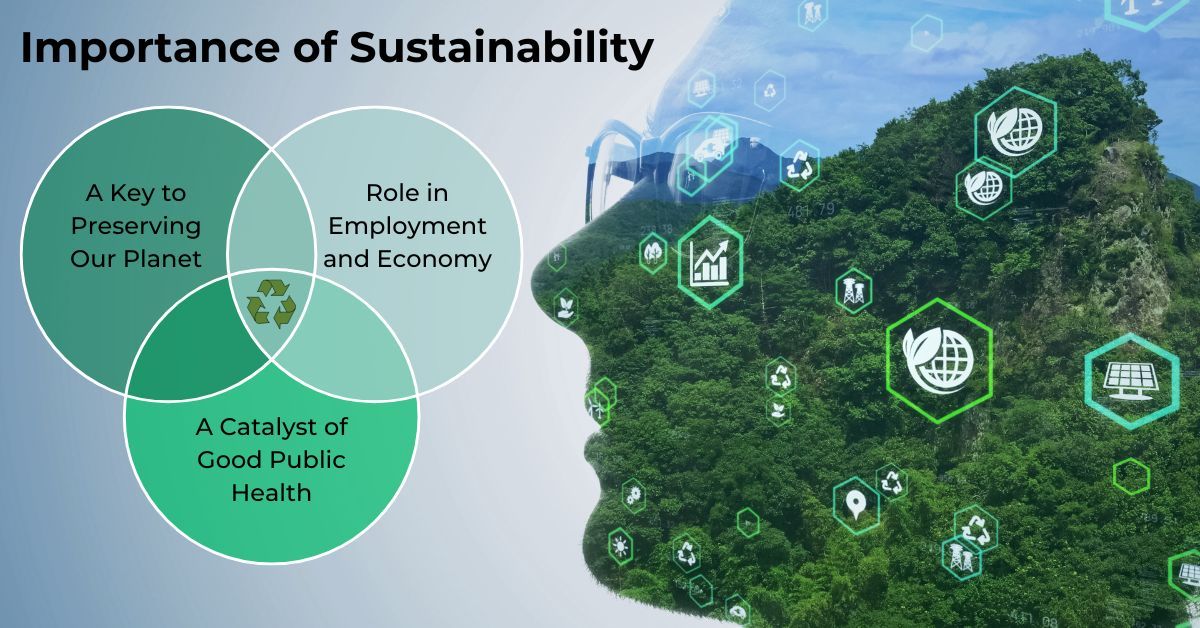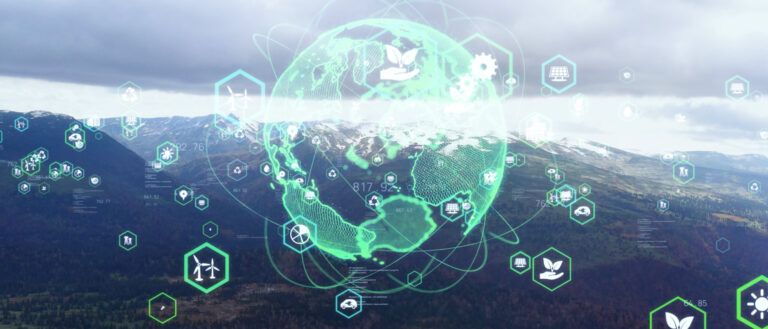Why is Sustainability in Business Important and How to Achieve it

In a recent survey by IBM, 51% of respondents from 10 major economies of the world said that environmental sustainability is more important to them today than it was twelve months ago. With this changing outlook toward sustainability, business leaders are facing the real challenge of securing the bottom line for their companies. And, ensuring the welfare of people and the planet. As a professional in any part of an organization, therefore, it has become necessary to understand why is sustainability important in business. Here’s a detailed guide for you to get started.
Why is Sustainability Important?
The word sustain originates from ‘sustinere’ in Latin, where sus-, means ‘up’ and tenēre means ‘to hold’. Sustainability is essential for keeping up with human needs in the long term. And, it was realized only in the last three decades that unchecked industrialization can adversely impact the environment and, in turn, society. Especially after the 1987 Brundtland Report, sustainability as a term gained more traction. People and organizations started grasping the importance of sustainability in conserving the environment as a whole. And, in turn, improving the quality of life for everyone. They started focusing on the smallest of actions, like switching off lights when not in use, to taking big decisions such as switching from electricity to solar energy.
Benefits of Sustainability
So why is sustainability important and can our actions really make a difference in preserving resources? Let’s look at some key benefits:
Energy Conservation
Sustainable practices in day-to-day business as well as strategic planning reduce energy costs and save energy. They include conscious actions such as cutting down excess energy usage, switching to sustainable energy resources, and improving manufacturing and supply chain efficiencies, among others. Several governments around the world offer significant tax incentives for using sustainable options such as electric vehicles (EVs).
A Healthier Environment
People only realize the importance of healthy environments when pollution levels rise alarmingly high. Reduced energy usage and switching to more sustainable energy sources lead to reduced pollution of natural resources such as air, water, and land, making the environment more livable. When more companies and people are conscious of their carbon footprint and their impact on the environment, it becomes healthier for everyone.
A Better Future for Everyone
Life on earth is interconnected. For example, global biodiversity levels have fallen to 75% as compared to preindustrial levels when a 90% level is needed to sustain important ecological processes crucial for human survival. With sustainable practices, we contribute to building a better future for everyone.
Importance of Sustainability
 Sustainability plays an important role in many aspects of our daily lives. The importance of sustainability can be demonstrated in the following ways.
Sustainability plays an important role in many aspects of our daily lives. The importance of sustainability can be demonstrated in the following ways.
A Key to Preserving Our Planet
Sustainable living practices not only help reduce pollution but also conserve natural resources like water and energy. Businesses and people that care about sustainability are also less likely to encroach upon the natural habitats of wild animals, thus helping protect the biodiversity of our planet.
Role in Employment and Economy
Sustainable business practices lead to the adoption of greener technologies and allow smaller businesses to thrive. Sustainable businesses also value people more and hence ensure better employment practices. Thus, sustainability has a key role to play in employment and in turn makes the economy more sustainable.
A Catalyst of Good Public Health
When businesses follow sustainable practices, they conserve energy and pollute less. This leads to better living environments and public health status.
Why is Sustainability Important for Future Generations?
The United Nations Brundtland Commission defined sustainability as “meeting the needs of the present without compromising the ability of future generations to meet their own needs.” Although it may seem obvious, a lot of us fail to practice it in our daily lives. We use energy as if there are unlimited natural resources, we pollute the environment as if nature can reverse it all. But every single action of ours has an impact on the availability of resources and the quality of nature around us. For example, temperatures have risen by 1.1C above 1850s levels, and if they rise to 1.7C-1.8C, about 50% of the world’s population will get impacted by life-threatening heat and humidity. Thus, sustainability is very important to ensure a liveable environment for future generations.
 Why Sustainability is Important in Business
Why Sustainability is Important in Business
Businesses are traditionally known to focus only on the bottom line, that is net earnings. However, with increasing awareness about sustainable practices, the triple bottom line approach has emerged which focuses on profit, people, and the planet. For example, according to a recent IBM survey, 49% of consumers say they’ve paid a premium for products branded as sustainable or socially responsible in the last twelve months. Let’s dig deeper into the reasons why sustainability is important in business:
Impact on People
Businesses that follow sustainable practices care more about their employees, customers, and society in general. They also actively work on empowering local communities, thus thinking about the larger goal of doing good for people. Since more people care about the outlook of companies towards people, this benefits the organization in the long run. For example, 70% of British millennials say they would stay with a company with a robust sustainability plan.
Impact on the Environment
Businesses that follow sustainability tend to protect nature and make conscious efforts to conserve natural resources. This not only enhances the image of the business in the eyes of customers and other stakeholders but also improves the availability of resources for everyone. For example, 48% of executives prioritize reducing the negative impact on the environment while reducing costs.
Competitive Advantage
It isn’t surprising to find the names of established companies on the front pages of newspapers for following crude business practices, such as polluting the environment, negligence of human rights, and more. These businesses eventually tend to bear losses. On the other hand, businesses that actively practice a sustainable approach gain a competitive advantage. For example, 80% of executives believe having a purpose beyond profits helps businesses increase customer loyalty.
Does Sustainability Matter to You?
Be it our daily lives, the environment around us, animal life, the water cycle, or even the economy, our actions and decisions impact those around us and far beyond. The least we can do is begin at home by following sustainable practices ourselves and inculcating the same in our families. In a corporate setting, it may be as simple as raising awareness about sustainable practices in our daily lives and as much as actually introducing sustainability in the way a business is conducted. If you are a professional and looking to learn more about sustainable business practices, you can sign up for one of the online sustainability courses offered by reputed universities through Emeritus.
Write to us at content@emeritus.org

















